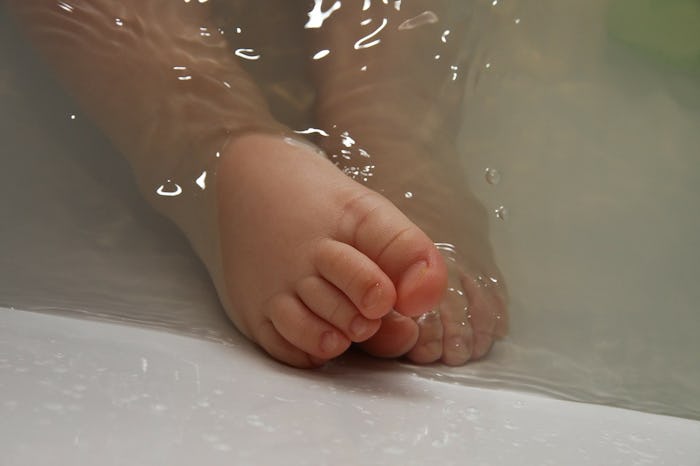Whether you're a proud adherent to the attachment style of parenting or you're just trying to save time and water, co-bathing seems to be a growing topic of conversation among parents. Though the practice of bathing with your infant is hardly anything new in the animal kingdom, I've had loads of friends, who self-identify as "crunchy mamas," posting their concerns about safety on social media. From wondering about the ideal water temperature to finding the times when you can't co-bathe with a newborn, it's helpful to remember that all of parenthood is one big learning experience.
Though some friends and frenemies have criticized parents, myself included, for showering with their child, it turns out that co-bathing with a newborn is safe when it's done correctly. Common sense can play a large role here when you're preparing for your first co-bathing experience, but there are probably still some questions you might have about the whole situation.
Luckily, experts in the parenting and medical fields have provided plenty of tips, tricks, dos, and dont's when it comes to all things co-bathing related. So if you're still curious about the safety aspects, check out these times when you can't and shouldn't co-bathe with your newborn child.
1Right After Circumcision
If you've made the choice to have your newborn son circumcised, the aftercare is particularly important. Though the area does need to be cleansed, there are some restrictions. According to the experts at What To Expect When You're Expecting, you should avoid getting your child in after circumcision until the penis is healed. So sticking to a sponge bath is probably your best bet until the healing is complete.
2Before The Umbilical Cord Falls Off
You may have been told this information shortly after your child's birth, but that whole time can easily become a blur of foggy memories. According to Healthy Children, an educational site from the American Academy of Pediatrics (AAP), your newborn should have only sponge baths until the stump of the umbilical cord falls off . You still may want to double check with your pediatrician for the green light before giving your newborn a proper bath.
3During Your Period
I was the kind of parent every pediatrician loathes, I'm sure, because I always came with a million and one questions during every visit. One concern I had in particular was a bit awkward, but I needed to ask. As it turns out, the pediatrician agreed that it was unsafe and unsanitary to co-bathe with my newborn while I was on my period.
4While You're Unfocused
Being exhausted, delirious, or losing concentration are all hallmarks of being a new parent. Yet you can't afford to let your tiredness take over during bath time. According to Healthy Children, you can't co-bathe with your infant while distracted and you shouldn't ever leave them alone in the tub for any reason.
5When You Don't Have An Exit Strategy
Though it's not completely necessary to have your partner present during co-bathing, you do need to have a plan in place for how you and your infant are going to get in and out of the tub. According to the National Childbirth Trust (NCT), an informational site and charity in the UK, you should make sure there is someone to pass your baby to, "as it can be difficult to get yourself and your baby out together safely." If you are by yourself, you can have a carrier lined with a towel next to the tub so you can place your baby there while you get in and out first.
6When The Water Is Too Hot Or Cold
Since your baby is just a newborn, you have to be especially cautious when it comes to the temperature of their bath. According to Baby Center, when co-bathing, "an ideal temperature is 98 to 100 degrees Fahrenheit (or 37 to 38 degrees Celsius), which is around body temperature." Otherwise your baby could lose body heat to quickly or get too warm.
7When The Water Is Soiled
This may seem like an obvious one, but according to my pediatrician, it's not quite as apparent as you might think. Though it's completely normal for your newborn to urinate or have a bowel movement in the soothing, warm conditions of a bath, you should cancel bath time if they have contaminated the water.
